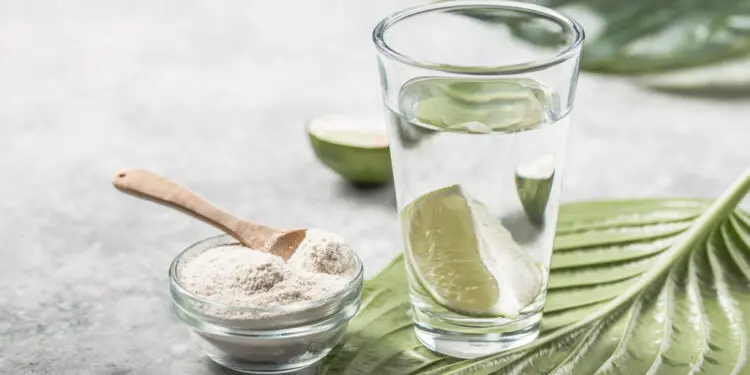Collagen is a protein that occurs naturally within the body and is important for healthy skin, hair, and nails. As we age, our natural supply of collagen diminishes, so to benefit from its positive effects on the body, you can top it up with collagen supplements.
There are two main types of collagen supplements: marine collagen, which is made from fish, and bovine collagen, which is made from cowhide. Although they are both safe to consume and are often used interchangeably in products due to their similar structures, there are some key differences between the two types of collagen.
In this piece, we are going to take a closer look at both marine collagen and bovine collagen to help us answer the question “is marine collagen better than bovine collagen”?
The rise of collagen
It’s no secret that health and well-being is a more popular market than ever, with factors such as social media and an ever-increasing access to information leading consumers to place a greater impetus on self-care. As part of that, there are often new trends in terms of products which seem to spring out of nowhere and take the conversation by storm. One of the more prominent trends over the last few years has undoubtedly been the rise of collagen supplementation.
In simple terms, collagen is an animal protein that is found extremely commonly throughout the human body. From bones, to skin, to connective tissues, collagen has a wide range of benefits and functions in a healthy body, not the least of which is the appearance of hydrated, youthful skin. With 28 types of collagen currently identified, products ranging from pre-mixed shots and tablets to creams and masks, and a variety of sources to choose from, it can be difficult to know where to start.
Here we’ll take a closer look at the two main sources from which collagen products are derived.
What are the two main types of collagen?
The two main sources of collagen are bovine, derived from cattle, and marine, from fish by-products and some invertebrates such as jellyfish. Both sources have similar benefits, meaning they can be useful throughout the body, from the thickness of the hair, to the plumpness and elasticity of skin and reduction in the signs of ageing. We have discussed the wide range of collagen-related benefits and how long it may take for them to take effect elsewhere, but the main thing to note is that there is no massive difference in benefits between marine and bovine sources.
What is the difference between marine and bovine collagen?
Although there is no marked difference when it comes to the health benefits between sources, there are certainly some more general distinctions between the two:
- Collagen Types – of the 28 currently identified types of collagen 1-3 are by far the most common. Type 1 is the most prominent, is closely associated with the health and appearance of skin and is present in both marine and bovine sourced collagen. Type 2 is found more readily in marine sources and related to healthy cartilage. Type 3, more common in bovine sourced collagen, is good for joints.
- Environmental Impact – although both sources are made from waste products, meaning that the sustainability of collagen supplements is generally considered to be quite high, marine collagen generally has the edge due to the amount of water needed to raise cattle.
- Absorption – it’s fair to say there are conflicting views on this – whereas bovine collagen is considered to be closer to human collagen and therefore easier to utilise, marine collagen is smaller in molecular structure and quicker to be absorbed.
- Ethical Implications – there are several religious, cultural and ethical reasons that bovine derived collagen may be unsuitable for the consumer, whereas marine collagen does not necessarily present the same issues.
Marine collagen
Marine collagen has high bioavailability and is sustainably produced. Marine collagen is best for beauty and anti-aging goals, helping to improve skin elasticity, moisture and texture as well as reducing signs of aging, and boosting hair and nail growth.
Marine collagen is produced from fish skin and scales – things that are often thrown away as waste – and are hydrolysed. When sourced from sustainable fisheries or from the wild, marine collagen has little negative impact on the environment and is as sustainable as any animal product can be.
Marine collagen is mostly type one collagen, and the peptide molecules are much smaller which makes them more bioavailable and easier to absorb into the body. It is absorbed up to 1.5 times more efficiently into the body. Since it is absorbed more efficiently and enters the bloodstream quicker it is considered to be the best source of collagen for the skin.
Both of these types of collagen are sourced from animals, and are therefore, not suitable for vegans. However, marine collagen can be taken by those who follow a pescatarian diet.
Bovine collagen
Bovine collagen is derived from cow hides. After cattle are harvested for their meat, the cow hides are removed and treated to extract collagen proteins. These hides can be sourced from either conventional feedlot cattle or grass-fed and finished cattle. So, if you are considering purchasing a product with bovine collagen in, look for grass-fed beef as this tends to be higher quality and prevents you consuming a collagen product produced by inhumane means.
Is marine collagen better than bovine collagen?
While we believe that collagen from both sources is to be highly recommended for the range of health benefits it can have when taken regularly as a supplement to a nutrient rich, varied diet, we think that marine collagen does carry the edge between the two. Ultimately your choice of collagen is a matter of fine margins and personal preferences, although we do feel that the environmental perspective is rightly taking on an ever-greater significance when it comes to choosing between similar products.
How to find the best kind of collagen
Ethical sources play a big part in deciding which kind of collagen to use. We would always recommend that bovine collagen is from grass-fed cattle and marine collagen is from responsibly sourced fish. Aside from that there are a number of considerations. While the benefits of collagen are broadly similar between the two sources, pay attention to whether your own needs would be better served by Type 2 or 3 supplements.
Another factor to pay attention to is whether or not your supplement contains any added ingredients. Added ingredients such as Vitamin C or Zinc are recommended for their contribution to the body’s ability to absorb the collagen provided, or otherwise hyaluronic acid in order to maximise the hydrating effects of collagen supplementation.
The main thing to take away is that marine and bovine sourced collagens are broadly similar, and both highly recommended, but for the reduced environmental and ethical implications, we feel marine collagen is the more desirable option.








